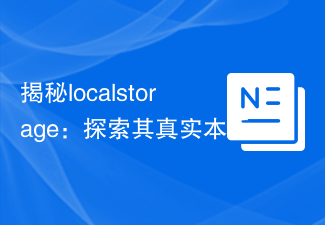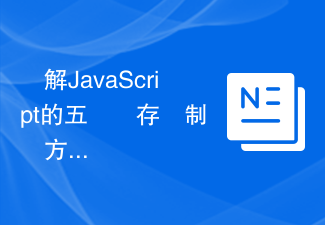 Backend Development
Backend Development PHP Tutorial
PHP Tutorial Discover ways to increase flexibility in data processing: Learn about Getter and Setter methods in PHP
Discover ways to increase flexibility in data processing: Learn about Getter and Setter methods in PHP
In-depth understanding of getters and modifiers in PHP: improving the flexibility of data processing
Introduction:
In object-oriented programming in PHP, we often It is necessary to obtain and modify the attributes of the class. But sometimes we need to perform some additional logical operations when obtaining or modifying properties, which requires the use of getters and modifiers in PHP. Getters and modifiers are a technique that provides additional processing when reading and modifying properties, allowing for greater flexibility in data processing. This article will take an in-depth look at getters and modifiers in PHP and how to apply them to optimize your code.
1. What are getters and modifiers
In PHP, getters and modifiers are a kind of magic method. Getters are used to perform additional logic processing when reading properties of a class, while modifiers are used to perform additional logic processing when modifying properties. They correspond to the magic methods __get and __set respectively.
The getter is defined as follows:
public function __get($property)
{
// 获取属性的值
// 进行额外的逻辑处理
// 返回属性的值
}The modifier is defined as follows:
public function __set($property, $value)
{
// 进行额外的逻辑处理
// 设置属性的值
}By using getters and modifiers, we can read and modify properties Add your own logical operations to improve the flexibility and readability of the code.
2. Why use getters and modifiers
Using getters and modifiers has the following benefits:
- Data checksum protection defines the getter and After the modifier, we can perform data verification and protection when reading and modifying properties. For example, we can check whether the value of an attribute meets a certain specification, and if it does not, throw an exception or perform other processing.
- Code readability and maintainability Getters and modifiers can centralize attribute acquisition and modification logic in one place, reducing code duplication and making the code more readable and maintainable. Maintainability. If we need to modify the logic of getting or modifying properties in the future, we only need to modify it in the getter or modifier, instead of modifying every place where the property is used.
- More control over properties Using getters and modifiers, we can set different logical processing for different properties. In this way, we can have stricter control over some sensitive attributes and perform ordinary processing on some common attributes.
3. Case Demonstration
Below, we will demonstrate how to use getters and modifiers through a specific case.
Suppose we have a User class whose attributes include name, age and email. We need to perform some standardized processing on age and perform format verification when setting up the email address. The code is as follows:
class User
{
private $name;
private $age;
private $email;
public function __construct($name, $age, $email)
{
$this->name = $name;
$this->age = $age;
$this->email = $email;
}
public function __get($property)
{
if ($property === 'age') {
// 年龄大于0小于150才合法
if ($this->age > 0 && $this->age < 150) {
return $this->age;
} else {
throw new Exception('Invalid age!');
}
}
return $this->$property;
}
public function __set($property, $value)
{
if ($property === 'email') {
// 使用正则表达式校验邮箱格式
if (preg_match("/^w+([.-]?w+)*@w+([.-]?w+)*(.w{2,3})+$/", $value)) {
$this->$property = $value;
} else {
throw new Exception('Invalid email format!');
}
} else {
$this->$property = $value;
}
}
}
$user = new User('John', 25, 'john@example.com');
// 正常获取年龄
echo $user->age; // 输出:25
// 尝试设置不合法的年龄
$user->age = -1; // 抛出异常:Invalid age!
// 正常设置邮箱
$user->email = 'test@example.com';
// 尝试设置不合法的邮箱格式
$user->email = 'test'; // 抛出异常:Invalid email format!In the above example, we performed legality verification when obtaining the age attribute, and performed format verification when setting the email attribute. By using getters and modifiers, we can process and verify data more flexibly.
Conclusion:
In PHP, getters and modifiers are important technologies to improve the flexibility of data processing. By using getters and modifiers, we can perform additional logical processing on the acquisition and modification operations of attributes, implement data validity verification, and increase the readability and maintainability of the code. In actual development, we should reasonably use getters and modifiers according to specific business needs to improve the quality and efficiency of the code.
(Word count: 1500)
The above is the detailed content of Discover ways to increase flexibility in data processing: Learn about Getter and Setter methods in PHP. For more information, please follow other related articles on the PHP Chinese website!
 探索id选择器的语法结构的深层次理解Jan 03, 2024 am 09:26 AM
探索id选择器的语法结构的深层次理解Jan 03, 2024 am 09:26 AM深入了解id选择器的语法结构,需要具体代码示例在CSS中,id选择器是一种常见的选择器,它根据HTML元素的id属性来选择对应的元素。深入了解id选择器的语法结构可以帮助我们更好地使用CSS来选择和样式化特定的元素。id选择器的语法结构非常简单,它使用井号(#)加上id属性的值来指定选择的元素。例如,如果我们有一个HTML元素的id属性值为"myElemen
 揭秘localstorage:探索其真实本质Jan 03, 2024 pm 02:47 PM
揭秘localstorage:探索其真实本质Jan 03, 2024 pm 02:47 PM深入了解localstorage:它到底是什么文件?,需要具体代码示例本文将深入探讨localstorage是什么文件,并提供具体的代码示例,帮助读者更好地理解和应用localstorage。localstorage是一种用于在Web浏览器中存储数据的机制。它可以在用户的浏览器中创建一个本地文件,用于存储键值对数据。这个文件是永久性的,即使在浏览器关闭后,数
 深入掌握Canvas技术的应用Jan 17, 2024 am 09:14 AM
深入掌握Canvas技术的应用Jan 17, 2024 am 09:14 AMCanvas技术是Web开发中非常重要的一个部分,通过Canvas可以实现在网页上绘制图形和动画。如果你想在Web应用中加入图形、动画等元素,那么Canvas技术千万不能错过。在本文中,我们将深入了解Canvas技术,并提供一些具体的代码示例。Canvas简介Canvas是HTML5的元素之一,它提供了一种在网页上动态绘制图形和动画的方法。Canvas提供了
 探索Java中的Cookie:揭开其真面目Jan 03, 2024 am 09:35 AM
探索Java中的Cookie:揭开其真面目Jan 03, 2024 am 09:35 AM深入了解Java中的Cookie:它到底是什么?在计算机网络中,Cookie是一个存放在用户计算机上的小型文本文件。它由Web服务器发送给Web浏览器,然后保存在用户本地的硬盘上。每当该用户再次访问同一网站时,Web浏览器会将该Cookie发送给服务器,从而提供个性化的服务。Java中也提供了Cookie类来处理和管理Cookie。一个常见的例子是购物网站,
 暸解JavaScript的五種緩存機制實現方法Jan 23, 2024 am 09:24 AM
暸解JavaScript的五種緩存機制實現方法Jan 23, 2024 am 09:24 AM深入了解:JS缓存机制的五种实现方式,需要具体代码示例引言:在前端开发中,缓存机制是优化网页性能的重要手段之一。通过合理的缓存策略,可以减少对服务器的请求,提升用户体验。本文将介绍五种常见的JS缓存机制的实现方式,并附带具体的代码示例,以便读者更好地理解和应用。一、变量缓存变量缓存是最基础也是最简单的一种缓存方式。通过将一次性计算的结果存储在变量中,避免重复
 深入了解Canvas:揭秘其独特特点Jan 06, 2024 pm 11:48 PM
深入了解Canvas:揭秘其独特特点Jan 06, 2024 pm 11:48 PM深入了解Canvas:揭秘其独特特点,需要具体代码示例随着互联网技术的快速发展,应用程序的界面设计也变得越来越多样化和富有创意。HTML5技术的出现为开发人员提供了更多丰富的工具和功能,其中Canvas是一个非常重要的组件。Canvas是HTML5中新增的一个标签,它可以用来在网页中绘制图形,制作交互性强的动画和游戏等。本文将深入探讨Canvas的独特特点,
 深入了解PHP数组中数据类型的查询方法Mar 13, 2024 pm 03:06 PM
深入了解PHP数组中数据类型的查询方法Mar 13, 2024 pm 03:06 PMPHP是一种广泛使用的服务器端脚本语言,常用于Web开发。在PHP中,数组是一种非常常见的数据类型,它能够存储多个值。在对数组进行操作时,了解数组中数据的类型是非常重要的,因为不同的数据类型可能需要使用不同的方法来查询。一、查询数组中数据类型的方法PHP中可以使用以下几种方式来查询数组中数据的类型:使用gettype()函数:该函数可以返回一个变
 了解Canvas:支持哪些编程语言?Jan 17, 2024 am 10:16 AM
了解Canvas:支持哪些编程语言?Jan 17, 2024 am 10:16 AM深入了解Canvas:支持哪些语言?Canvas是一种强大的HTML5元素,它提供了一种使用JavaScript绘制图形的方法。作为一个跨平台的绘图API,Canvas不仅支持绘制静态图像,还可以用于动画效果、游戏开发、数据可视化等领域。在使用Canvas之前,了解Canvas支持哪些语言是非常重要的。本文将深入探讨Canvas所支持的语言。JavaScri


Hot AI Tools

Undresser.AI Undress
AI-powered app for creating realistic nude photos

AI Clothes Remover
Online AI tool for removing clothes from photos.

Undress AI Tool
Undress images for free

Clothoff.io
AI clothes remover

AI Hentai Generator
Generate AI Hentai for free.

Hot Article

Hot Tools

DVWA
Damn Vulnerable Web App (DVWA) is a PHP/MySQL web application that is very vulnerable. Its main goals are to be an aid for security professionals to test their skills and tools in a legal environment, to help web developers better understand the process of securing web applications, and to help teachers/students teach/learn in a classroom environment Web application security. The goal of DVWA is to practice some of the most common web vulnerabilities through a simple and straightforward interface, with varying degrees of difficulty. Please note that this software

Atom editor mac version download
The most popular open source editor

Dreamweaver Mac version
Visual web development tools

PhpStorm Mac version
The latest (2018.2.1) professional PHP integrated development tool

SecLists
SecLists is the ultimate security tester's companion. It is a collection of various types of lists that are frequently used during security assessments, all in one place. SecLists helps make security testing more efficient and productive by conveniently providing all the lists a security tester might need. List types include usernames, passwords, URLs, fuzzing payloads, sensitive data patterns, web shells, and more. The tester can simply pull this repository onto a new test machine and he will have access to every type of list he needs.





